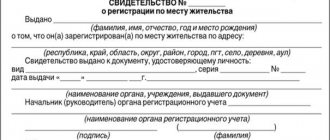The significant difference between a person's place of residence and temporary stay is the time during which he remains there. Place of residence is a permanent address at which a person has the right to reside for an unlimited number of years. He can be discharged only at his own request or in certain other cases.
A temporary stay is the actual location of a person, limited to a certain period of time. Usually this period is established by documents on the basis of which a citizen receives the right to reside in a certain place.
Legislation
Depending on these concepts, the legislation establishes various requirements for registration of citizens. For example, a person must be registered within 3 months if his stay in a given locality is planned for longer than 90 days.
Violations of this legislation are subject to administrative penalties. Moreover, it is imposed not only on the citizen who violated the registration procedure, but also on the owner of the home where the violator lived all this time. However, the owner’s guilt must be proven with documents.
For a violator of the registration procedure, the fine will be 1,500-2,000 rubles, and for the home owner - 2,000-2,500 rubles. Thus, the owner of the property should not prevent a person who legally lives in his apartment from obtaining temporary registration.
Tip 1: What is the difference between residential address and registered address?
There are three types of addresses in circulation – legal, actual and postal. All of them are actively used by firms and enterprises of various purposes and sizes. Should the actual address be the same as the postal address? How to formalize them correctly so as not to have problems with the law?
The actual address may be the legal address at which the individual entrepreneur is registered. Both the main office and production sites have the right to be located there. The legislation assumes that at the actual address you can find either a representative of the enterprise or the place where the products are manufactured.
Interesting: Sales Tax on a House with Land Owned for Less than 3 Years
Types of registration
Depending on the length of a person’s stay, there are different types of registration. Exists:
- temporary;
- constant.
For permanent residence, permanent registration is used. If a person is temporarily forced to move to another locality for a period of more than 90 days, then he must obtain a temporary registration.
However, the main registration is not cancelled. A master registration may only expire under certain circumstances other than lapse of time. A temporary one expires upon the expiration of the specific validity period for which it was issued. But it can be extended an unlimited number of times.
Permanent registration
Grounds for termination of the main registration can only be significant circumstances, such as:
- death of a registered person;
- filing an application for deregistration by the citizen himself;
- registration at a new address;
- if a person is declared missing by a court;
- in case of transfer of property rights to third parties for whom the registration of this person is an unnecessary burden;
- in some other cases provided for by law.
If a citizen resides permanently in an apartment, he or she must register there within 7 days. The legal grounds on which he can permanently reside at this address may be the following:
- The citizen is the owner of this property.
- A person lives at this address on the basis of a rental or rental agreement, as well as other types of transactions giving the right to reside.
- Due to the presence of family ties with the owners of the property.
To register on a permanent basis, a citizen must:
- Collect the necessary documentation.
- To write an application.
- Submit all documents to the registration authorities.
- Receive the result in the form of a stamp in your passport or in the form of a registration certificate if you do not have a passport (for minors).
The main documents that will need to be provided to obtain permanent registration are:
- personal passport of a citizen of the Russian Federation;
- title documents for housing, if available;
- consent of the owners in case of registration of a non-owner;
- permission from municipal authorities in the case of registering a person in municipal housing;
- certificate of the size of the family registered at this address;
- documents confirming family ties;
- application requesting registration.
Registration is carried out within 3 days. After accepting the papers, the registration authority employee will inform you of the date and time when you can receive your passport or certificate.
To register children if one of their parents is registered at this address, permission from the property owners and the municipality is not required.
Temporary registration
Based on documents confirming the actual temporary stay of a citizen in a given locality, a certificate of the established form 8 is issued, which is filled out on a special form. This form has a specific identification number, which is listed in the general migration database.
To obtain it, you must go through a similar algorithm as when obtaining permanent registration. Only deregistration will not be carried out at the place of permanent registration. The result of registration will be the issuance of a certificate.
This document has the following data:
- barcode and identification code in the left corner;
- the title of the document is in the middle of the document at the very top;
- certificate number in the upper right corner;
- personal information about who this document was issued to, as well as information about his date and place of birth;
- address of the person’s place of residence;
- validity period of this document;
- passport details of the citizen;
- name of the authority that issued this certificate;
- position and personal details of the official who signed the document;
- Federal Migration Service stamp and date of issue.
To obtain such documentary evidence of temporary registration, you need to collect the following documentation:
- personal passport;
- statement;
- papers giving grounds for legal residence in this residential premises;
- consent of the homeowner.
Once these documents are submitted, staff will officially notify the homeowner and their guest that the application has been received. If both confirm their agreement to temporarily register this applicant, the certificate will be issued within 3 days.
Cases of violations and coincidence of addresses
Individuals living in the Russian Federation should know what awaits them if their actual residential address and registration address do not match. Such an act is equivalent to violating the terms of registration, because when moving to another address, a citizen is obliged to notify the FMS and undergo re-registration.
For violation of deadlines, fines range from two to three thousand rubles. A person who offered his residential property as a place of residence to a citizen, but did not document the process, is subject to a penalty in the amount of five thousand rubles.
Registration at the place of permanent residence differs from registration at the address of residence in a number of features, the main of which are deadlines, documents and grounds.
Registration at place of residence
can be issued only with the consent of the owner and registered people.
Read more about the rules for deregistration at your place of residence.
Also read what the Federal Law on Registration at the Place of Residence says.
Comments from lawyers on the topic of whether the place of residence is the place of registration or residence. Collisions of legislation.
A large number of questions raise controversy: place of residence is the place of registration of a person or place of residence? Let’s try to take a closer look at these concepts and figure out how one differs from the other. Given the conflicts of legislation, lawyers can endlessly find out how the place of residence actually differs from the place of registration and ultimately fail to come to a common opinion
. However, you should not rely on lawyers; it would be more correct to turn to practice and regulations.
Dear readers!
The articles contain solutions to common problems. Our lawyers will help you find the answer to your personal question free of charge To solve your problem, call:
+7 ext. 213 – Moscow, Moscow region
+7 ext. 432 – St. Petersburg, Leningrad region
8 ext. 184 – Federal number
In practical terms, the topic under consideration is regulated mainly by two legislative documents. First of all, this is the Law on the Rights of Citizens regarding free movement, as well as the rules of registration and accounting, which were approved by Government Decree No. 713 of July 17, 1995. There are a number of codes containing the concept of residence, for example:
- civil procedural;
- family;
- about administrative violations.
But they do not regulate the registration process as such, therefore, in the issues discussed in the article, it is necessary to rely on the two documents discussed above.
The main differences between the place of residence and the place of registration
Temporary residential facilities include recreation centers, health institutions, camps, hotels, sanatoriums, and rental housing. Employees of public institutions (sanatoriums, hotels) register guests themselves; in other cases, the person must notify them about their stay.
The place of stay, as mentioned above, is a residential premises where a person temporarily lives for a period established by law. At the same time, the law clearly states which institutions are considered temporary locations: sanatoriums, rest homes, bases, campsites, and so on.
12 Aug 2020 glavurist 115
Share this post
Related Posts
What is the difference between registration at the place of residence and registration at the place of stay?
The place of residence is the place where a citizen permanently or primarily resides (Part 1 of Article 20 of the Civil Code of the Russian Federation). All persons permanently residing in the territory of the Russian Federation (citizens of the Russian Federation, stateless persons, foreign citizens) are subject to registration at the place of residence. Citizens who arrive for temporary residence in residential premises that are not their place of residence for a period of more than 10 days are required to contact the officials responsible for registration within 3 days from the date of arrival (excluding weekends and holidays).
Interesting: Which group of fixed assets does furniture belong to?
No. 713, registration at the place of stay was limited to 6 months. And only in the event of a serious illness of the registered or close relatives themselves, as well as in the event of other extenuating circumstances, the period of stay could be extended. By decision of the Constitutional Court of the Russian Federation on 02.02.98 No. 4-P, such a restriction was recognized as inconsistent with the Constitution of the Russian Federation. Now all refusals to renew registration have no legal force.
Place of residence of the child
The law considers children under 14 years of age incompetent. That is, they exercise rights and obligations through legal representatives. These are parents, guardians or trustees.
The place of residence of a minor under 14 years of age, as well as a citizen declared incompetent, is the place of residence of his legal representatives. The consent of the owner or tenant is not required to move in a minor (under 14 years of age). He moves in automatically with one of the parents. Or with both (if their place of residence coincides). The place of residence of a person over 14 years of age may differ from the place of residence of parents or legal representatives.
To determine the place of residence of a child with one of the parents, if there is a dispute, you will have to go to court. To do this, a statement of claim is drawn up to determine the child’s place of residence.
Freedom of movement of citizens is associated with reaching the age of 14 years. And up to the age of 14, the state determines the place of residence of children exclusively according to their legal representatives.
According to paragraph 2 of Art. 36 of the Civil Code of the Russian Federation, guardians and trustees of minors are required to live together with their wards. Separation is possible if the ward has reached 16 years of age. Based on this, the place of residence of a minor under 16 years of age, to whom the guardianship authority has appointed a guardian (orphans), determines the place of his guardian. And if they live separately, it is determined on a general basis. The law follows the path that the municipality where the orphan lives must provide housing for orphans.










